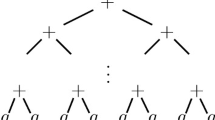Abstract
A new proof is given for the well-known theorem of Putnam, Davis, and Robinson on exponential diophantine representation of recursively enumerable sets. Starting from the usual definition of r.e. sets via Turing machines, a new method of arithmetization is given. This new method leads directly to a purely existential exponential formula. The new proof may be more suitable for a course on the theory of algorithms because it requires less knowledge of number theory.
Similar content being viewed by others
Literature cited
M. Davis, H. Putnam, and J. Robinson, “The decision problem for exponential diophantine equations,” Ann. Math.,74, No. 3, 425–436 (1961).
M. Davis and H. Putnam, “On Hilbert's tenth problem,” U.S. Air Force O.S.R. Report, AFOSR TR 59-124, Part III (1959).
J. Robinson, “The undecidability of exponential diophantine equations,” Notices Am. Math. Soc.,7, 75 (1960).
Yu. I. Manin, “Hilbert's tenth problem,” Sovrem. Prob. Mat.,1, 5–37 (1973).
Yu. V. Matiyasevich, “Diophantinesets,” Usp. Mat. Nauk,27, 185–222 (1972).
M. Davis“Hilbert's tenth problem is unsolvable,” Am. Math. Monthly,80, No. 3, 233–269 (1973).
M. Davis, “Arithmetical problems and recursively enumerable predicates,” J. Symbol. Logic,18, No. 1, p. 33–41 (1953).
Yu. Matiyasevich, “On recursive unsolvability of Hilbert's tenth problem,” Proc. IV, Int. Congress Logic, Method. and Phil. of Sci. (Bucharest, 1971), North-Holland (1973), pp. 89–110.
Yu. V. Matiyasevich, “Theexistence of noneffectizable estimates in the theory of exponential diophantine equations,” Zap. Nauch. Sem. Leningr. Otd. Mat. Inst. Akad. Nauk SSSR,40, 77–93 (1974).
K. Hirose and Sh. Iida, “A proof of negative answer to Hilbert's tenth problem,” Proc. Jpn. Acad.,49, 10–12 (1973).
Yu. Matiyasevich and J. Robinson, “Reduction of an arbitrary diophantine equation to one in 13 unknowns,” Acta Arithm.,27, 521–553 (1975).
E. E. Kummer, “Uber die Erganzungsreihe zu den algemeinen Reciprotatsgesetzen,” J. Reine Angew. Math.,44, 93–146 (1852).
L. E. Dickson, History of the Theory of Numbers, New York (1952).
D. Singmaster, “Notes on binomial coefficients, I, II, III,” J. London Math. Soc.,8, No. 3, 545–548, 549–554, 555–560 (1974).
J. Robinson, “Existential representability inarithmatic,” Trans. Am. Math. Soc.,72, No. 3, 437–449 (1952).
Yu. V. Matiyasevich, “Enumerable sets are diophantine,” Dokl. Akad. Nauk SSSR,191, No. 2, 279–282 (1970).
N. K. Kosovskii, “On diophantine representation of the sequence of solutions of Pell's equation,” Zap. Nauch. Sem. Leningr. Otd. Mat. Inst. Akad. Nauk SSSR,20, 49–59 (1971).
G. V. Chudnovskii, “Certain arithmetical problems,” Inst. Mat. Akad. Nauk Ukrains. SSR, Preprint IM-71-3.
Yu. V. Matiyasevich, “Diophantine representation of the set of prime numbers,” Dokl. Akad. Nauk SSSR,196, 770–773 (1971).
Yu. V. Matiyasevich, “Diophantine representation of enumerable predicates,” Izv. Akad. Nauk SSSR,35. Ser. Mat., 3–30 (1971).
M. Davis, “An explicit diophantine definition of the exponential function,” Commun. Pure Appl. Math.,24, No. 2, 137–145 (1971).
Yu. V. Matiyasevich, “Theconnection between systems of equations in words and their lengths and Hilbert's tenth problem,” Zap. Nauch. Sem. Leningr. Otd. Mat. Inst. Akad. Nauk SSSR,8, 132–144 (1968).
V. G. Durnev, “On equations in free semigroups and groups,” Mat. Zametki,16, No. 5, 717–724 (1974).
Author information
Authors and Affiliations
Additional information
Translated by J. P. Jones and L. Guy.
Translated from Zapiski Nauchnykh Seminarov Leningradskogo Otdeleniya Matematicheskogo Instituta im. V. A. Steklova Akad. Nauk-SSSR, Vol. 60, pp. 75–92, 1976. Main results announced June 19, 1975.
Rights and permissions
About this article
Cite this article
Matiyasevich, Y.V. A new proof of the theorem on exponential diophantine representation of enumerable sets. J Math Sci 14, 1475–1486 (1980). https://doi.org/10.1007/BF01693980
Issue Date:
DOI: https://doi.org/10.1007/BF01693980




